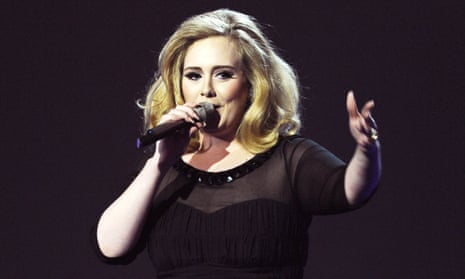No offence to Adele, but she doesn’t half make being 25 sound miserable. And that, of course, is her genius. The new album from pop’s queen of heartbreak is already the biggest seller of the year in the US (older readers; it’s that one featuring Hello, the quivery song that makes you wonder vaguely if Lionel Ritchie is still alive when it comes on the car radio).
And it’s trouncing all comers for a reason. If Adele’s last album, 21, was the breakup soundtrack of choice for a generation of young women, then 25 is the definitive soundtrack to anxiously dissecting everything that’s wrong with your life over a bucket of pinot grigio. Close your eyes and remember not just the insane highs and lows of being twenty-something and in love but the endless, tortuous overthinking of it all. “I’m so mad I’m getting old,” she sings, aged all of 27. Well, hello from the other side of 40, Adele; the good news is things will eventually get better.
Human happiness is U-shaped, according to new research from a team at Warwick University, which basically repeats a line happiness researchers have been trotting out since forever: on average, humans tend to be happy as children, only to plummet downhill in their teens, as sexual rejection and hating your parents and the terror of not fitting in with everyone else starts to bite. Things reach rock bottom in the early 40s, but after this comes a rather less well-documented climb out of the trough of despond. Humanity returns to peak happiness somewhere in early retirement, before beginning one last downward slide.
That pattern has been shown to hold true across different cultures and economic conditions (so it’s not, for example, about the recession crushing youthful career prospects). It’s not to do with parenthood, either, even though the happiness nadir coincides neatly with the years of sleepless nights and nappies; it remains true even when you control for parenthood and employment status. Youth isn’t everything it’s cracked up to be. But why does middle age get such a lousy press?
What the graphs don’t show, perhaps, is that the happiness that comes flooding back in midlife may not be the same kind as before. Happiness is one word for what some are lucky enough to feel in our 40s. But a better one might be that underrated thing, contentment.
Nobody under the age of 30 should ever be content. Contentment is a killer then, cosily smothering ambition and passion and progress; what’s the point of being young if you’re not restless, constantly afraid of missing out on something better? But give it a couple of decades, and suddenly contentment rather comes into its own.
For being young and bursting with promise is ultimately quite exhausting. Humankind can only take so many years of constantly feeling it has something to prove, that any minute now it might be found out, that it ought to be constantly striving for something better. Middle age is nature’s way of forcing humans to accept that this is as good as it gets, and actually that’s good enough. What is harder to explain to anyone under 40, however, is that this coming to terms with life’s inevitable disappointments need not be nearly as dismal a process as it sounds.
One theory of middle-aged happiness is that something changes in the chemistry of an ageing brain; that middle-aged neurons fire less strongly in response to distressing images and events than to good ones, and so we simply see the same old reality in a more positive light. Experience teaches us, perhaps, to care less about negative feedback and filter out things that would once have made us unhappy.
And yet, if anything, fortysomething happiness feels defined not by ignorance of the alternatives but by an acute awareness of them. We are sailing into cooling waters, seas thickened with icebergs, and we know it.
Endless summers of going to other people’s weddings give way to winters of divorce, and Christmas cards that arrive with names missing. A woman on the school run starts wearing a headscarf, and nobody needs to be told why her hair is falling out. We go to funerals of people who did not seem old. Things happen that all the music in the world cannot make better and suddenly just standing still – still in that job, still married to the same person, kids all fine – starts to feel like an achievement. The things we took for granted are worry beads in a string now, constantly checked over. Middle-aged happiness is neither smug nor self-satisfied.
But what nobody ever talks about is the glorious surge of relief that follows the realisation you can finally stop trying so hard at everything; or at least at the stuff that, by comparison, no longer seems to matter. The quintessence of middle age isn’t weeping hot menopausal tears for the lost beauty most of us never had in the first place. It’s flipping past pictures of actresses in tiny red-carpet frocks, their implausible faces frozen somewhere in the 1990s, and feeling merely sorry for anyone forced to go out in November without a coat.
It’s trudging home past shiny girls heading off into the hopeful dark of Friday night, wobbly as foals in new heels plus a bottle of prosecco, and feeling not envious but amazingly cheered; that the ritual still goes on, and that it goes on without you. (If teenage Facebooking is all about worrying that everyone else seemingly gets invited to wilder parties, midlife Twitter is comforting proof of how many otherwise interesting adults clearly also spend their evenings in with a laptop.)
It’s the sweet spot between no longer hankering after youth, but not yet having forgotten what it felt like; the moment in When Harry Met Sally when their smug married friends put the phone down on frantic post-coital phone calls from the pair of them and she says feelingly: “Tell me I’ll never have to be out there again.”
It’s finally being able to potter around garden centres without shame, and admit that you’d rather not go out on New Year’s Eve than spend three hours looking for a cab. Honestly, Adele, you’re going to love 45. Although getting a whole album out of it might be tricky.

